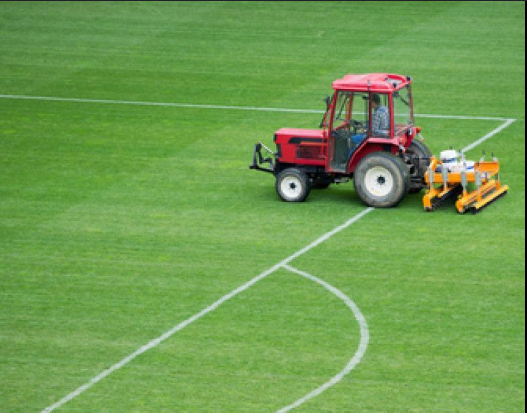Field maintenance is crucial for ensuring that athletic grounds remain safe, playable, and visually appealing. Whether it’s a football field, soccer pitch, or any other athletic area, regular upkeep helps prevent injuries and enhances performance. This comprehensive guide will explore the importance of field maintenance, key services involved, and how professional turf management can transform your athletic fields.
Importance of Regular Field Maintenance
Regular field maintenance is essential for preserving the quality of athletic surfaces. Over time, fields experience wear and tear due to usage, weather conditions, and other environmental factors. Neglecting maintenance can lead to deteriorating field conditions, increasing the risk of injuries for players and reducing the overall performance of the surface. Proper maintenance not only enhances player safety but also contributes to better gameplay experiences.
Understanding Turf Management
Turf management encompasses a variety of practices aimed at maintaining healthy grass and soil conditions on athletic fields. Effective turf management plays a pivotal role in ensuring that fields remain lush and playable. This involves regular soil health assessments, proper irrigation practices, and strategic fertilization schedules to promote robust grass growth. By understanding the fundamentals of turf management, field operators can significantly improve the performance and longevity of their athletic surfaces.
Common Challenges in Field Maintenance
Field managers often face several challenges that can affect the condition of athletic grounds. Common issues include:
- Weeds: Weeds compete with grass for nutrients and water, leading to poor turf health.
- Pests: Insects and other pests can damage grass, creating bare patches and unhealthy areas.
- Drainage Problems: Poor drainage can lead to waterlogged fields, which may inhibit grass growth and create muddy conditions.
Understanding these challenges is the first step in developing effective maintenance strategies that ensure the best possible conditions for athletes.
Key Services for Effective Field Maintenance
Aeration and Dethatching: Aeration involves perforating the soil with holes to allow air, water, and nutrients to penetrate deep into the roots. Dethatching removes the layer of dead grass and debris that accumulates on the surface. Both practices are essential for maintaining healthy turf, as they improve soil health and encourage robust grass growth.
Fertilization and Soil Testing: Regular fertilization is vital for providing the necessary nutrients to grass. Conducting soil tests helps determine the nutrient levels and pH balance, enabling field managers to apply fertilizers appropriately. This tailored approach ensures that the grass receives the right nutrients for optimal growth.
Irrigation and Water Management: Proper irrigation is critical for maintaining healthy turf. Implementing efficient irrigation systems ensures that fields receive the right amount of water, promoting strong root systems and preventing drought stress. Regular monitoring of soil moisture levels can help adjust watering schedules as needed.
Pest and Weed Control: Effective pest and weed control strategies are necessary to maintain the health of athletic fields. Integrated Pest Management (IPM) techniques focus on minimizing chemical use while effectively controlling pests and weeds. Regular inspections and timely interventions can help keep fields safe and attractive.
Mowing and Lawn Care: Regular mowing is essential for maintaining the appearance and health of the turf. Proper mowing techniques, including setting the right height and frequency, help encourage dense growth while preventing weeds. Consistent lawn care practices contribute to a professional look and ensure a safe playing surface.
Professional Field Maintenance Services
Hiring professionals for field maintenance can offer significant advantages. Experienced turf management companies, like Tree Pruning, provide specialized services tailored to meet the unique needs of each field. Professional teams have the knowledge, equipment, and expertise to implement effective maintenance strategies, ensuring that fields remain safe and high-performing.
Seasonal Field Maintenance Tips
Spring Maintenance: In spring, it’s essential to prepare fields for the upcoming playing season. This includes aeration, fertilization, and overseeding to promote new grass growth. Spring maintenance sets the stage for healthy turf throughout the year.
Summer Care: During the hot summer months, fields require extra attention to combat heat and potential drought conditions. Implementing efficient irrigation practices and monitoring soil moisture levels are critical for maintaining turf health during this time.
Fall Preparation: As the playing season winds down, fall maintenance focuses on winterizing fields. This includes tasks such as aeration, fertilization, and cleaning up debris to protect the turf from harsh winter conditions.
Winter Care: Even during winter, fields require attention. Snow management and limited access to fields can impact turf health. Proper care during the cold months, including protective measures against ice and snow accumulation, is crucial for maintaining healthy grass for the next season.
Takeaway
Regular Field Maintenance & Turf Management are vital for ensuring the safety and performance of athletic grounds. By investing in professional services and adopting best practices, field managers can create environments that enhance player performance and minimize injury risks. Don’t wait until problems arise; prioritize field maintenance for optimal results.




